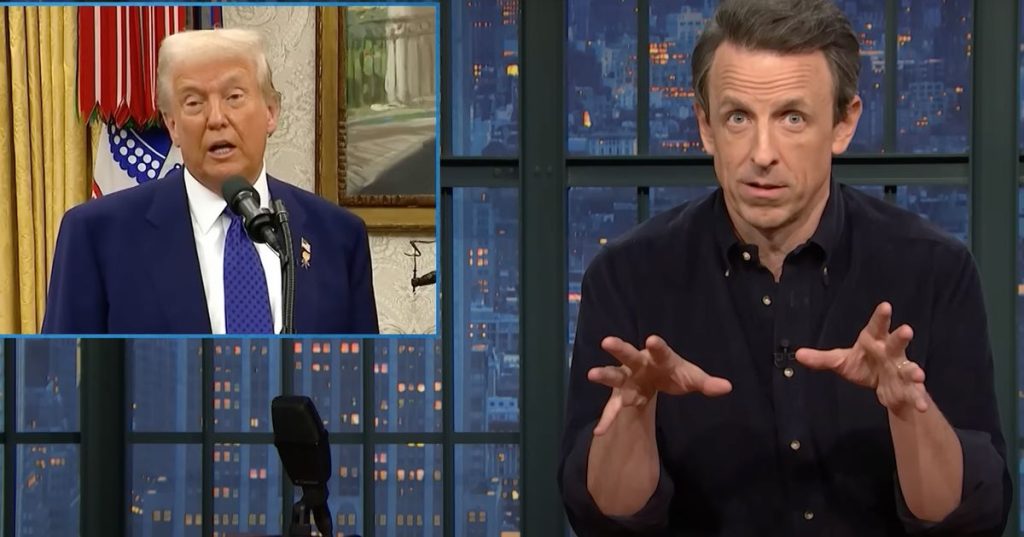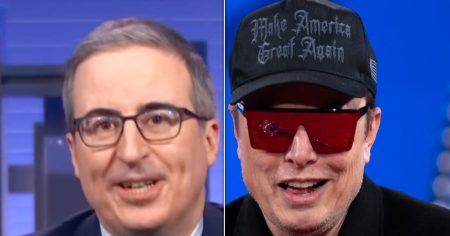Seth Meyers Roasts Trump’s Bizarre Speech, Leaving Everyone Wondering: "What Is He Talking About?"
Seth Meyers, the host of Late Night, didn’t hold back on Thursday as he tore into Donald Trump’s latest rambling speech. The comedian used his platform to ridicule the former president’s bizarre and meandering comments, which left audiences scratching their heads. Trump’s speech was filled with confusing references to the USS Gerald R. Ford, its architect, magnets, hydraulics, and a whole lot more. Meyers, like many others, was left asking the obvious question: “What are you talking about?”
The comedian’s criticism wasn’t just playful; it was laced with frustration. Meyers openly expressed his bewilderment, saying, “I’m not asking rhetorically. For real, can you tell us what the fuck you’re talking about?” His exasperation mirrored that of many who have grown accustomed to Trump’s unconventional communication style, which often seems to prioritize spectacle over clarity. For Meyer, Trump’s speech was like jumping into the middle of a TV show without knowing the plot. “Every time Trump speaks, I feel like a guy who started Season 2 of ‘Severance’ without watching Season 1,” he joked. “‘Wait, why are they on a frozen lake? Also, who’s Ricken?’”
Trump’s Speeches: A Mix of Chaos and Confusion
Trump’s speeches have always been a unique blend of bravado, exaggeration, and, at times, sheer nonsense. But his latest remarks took the cake, even by his standards. The former president’s references to the USS Gerald R. Ford, a state-of-the-art aircraft carrier, were particularly puzzling. He rambled on about its architect, magnets, hydraulics, and other unrelated topics, creating a narrative that was as disjointed as it was bizarre. Meyers seized on this confusion, using it as fodder for his show.
The comedian’s jokes weren’t just about the content of Trump’s speech but also about its delivery. Trump’s speaking style has always been divisive. While his supporters often praise his ability to connect with everyday Americans, his critics argue that his rambling, disjointed delivery undermines his message and creates more confusion than clarity. For Meyers, Trump’s speeches are like a bad TV show—one that you can’t stop watching, no matter how confusing it gets.
The Heist Movie Analogy: When Trump’s Stories Sound Like a Action Film
One of the most hilarious moments of Meyers’ critique came when he compared Trump’s stories to a heist movie. “All of the president’s stories sound like a heist movie where everyone agreed not to use real names,” he quipped. The idea that Trump’s anecdotes are so vague and filled with cryptic references that they sound like a poorly planned robbery movie is both funny and surprisingly accurate.
Meyers’ analogy highlights one of the most frustrating aspects of Trump’s communication style: his tendency to use vague language and cryptic references that leave listeners guessing. Whether he’s talking about the USS Gerald R. Ford or some other topic, Trump often seems more interested in creating drama than in providing clear, coherent information. It’s like watching a movie where the characters are speaking in code, and you’re left trying to piece together the plot.
The Broader Implications of Trump’s Communication Style
While Meyers’ jokes were undeniably funny, they also touched on a deeper issue: the impact of Trump’s communication style on American politics. Love him or hate him, Trump has a unique ability to dominate the conversation. His speeches, tweets, and interviews are often chaotic and unpredictable, but they also have a way of keeping people engaged.
However, this style comes at a cost. Trump’s tendency to ramble and use vague language can make it difficult to understand his policies or his vision for the country. For critics like Meyers, this kind of communication is not just confusing—it’s a hindrance to meaningful discourse. “What are you talking about?” Meyers asked, and it’s a question that many Americans have been asking themselves for years.
The Entertainment Value of Trump’s Speeches
Despite the frustration that Trump’s speeches often inspire, there’s no denying that they are entertaining. Love him or hate him, Trump has a flair for the dramatic. His speeches are like a reality TV show—unpredictable, over-the-top, and impossible to look away from. For comedians like Meyers, Trump’s speeches are a goldmine of material. They’re a never-ending source of jokes, memes, and late-night monologues.
But the entertainment value of Trump’s speeches comes with a caveat. While it’s easy to laugh at the absurdity of it all, it’s important to remember that Trump’s words have real-world consequences. His speeches may be confusing and chaotic, but they also have the power to shape public opinion, influence policy, and even incite action. For Meyers and other critics, the challenge is to find a balance between laughing at the absurdity and taking Trump’s impact seriously.
Conclusion: When Politics Meets Comedy
In the end, Seth Meyers’ critique of Trump’s speech was both funny and thought-provoking. It reminded us that politics and comedy are often intertwined, and that even in the most confusing and chaotic moments, there’s room for humor. Trump’s speeches may be baffling, but they’re also a reminder of the power of language—and the importance of paying attention to what our leaders are saying.
For Meyers, Trump’s latest ramblings were just another opportunity to poke fun at a political figure who has become a fixture in the world of late-night comedy. But for the rest of us, they’re a reminder that politics is never just serious business. Sometimes, it’s just plain entertaining.















